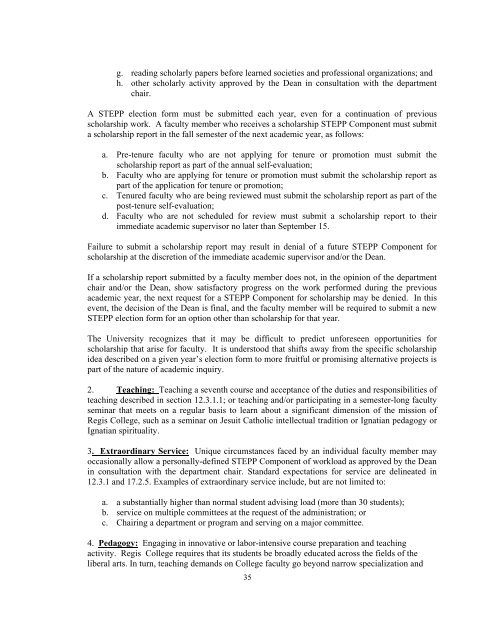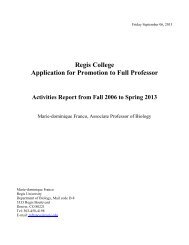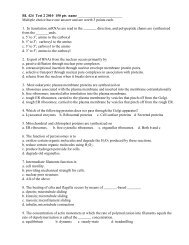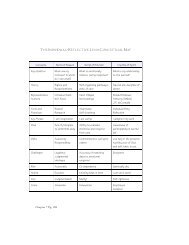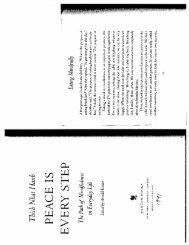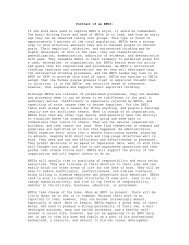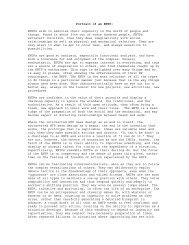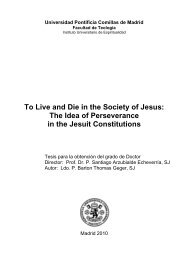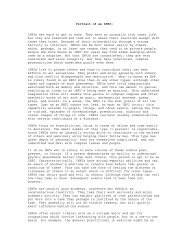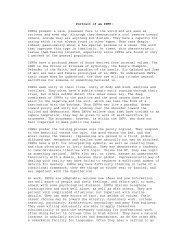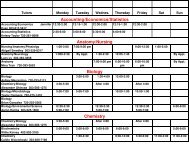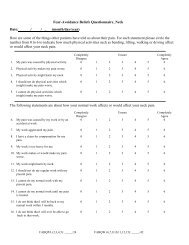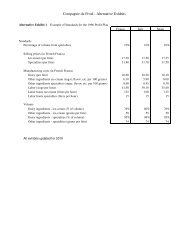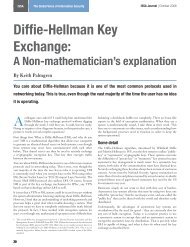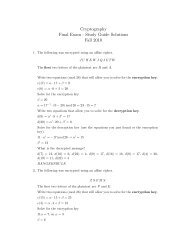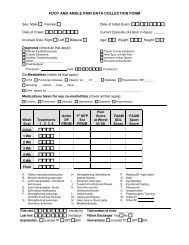The Regis College full Faculty Handbook may be viewed here.
The Regis College full Faculty Handbook may be viewed here.
The Regis College full Faculty Handbook may be viewed here.
Create successful ePaper yourself
Turn your PDF publications into a flip-book with our unique Google optimized e-Paper software.
g. reading scholarly papers <strong>be</strong>fore learned societies and professional organizations; and<br />
h. other scholarly activity approved by the Dean in consultation with the department<br />
chair.<br />
A STEPP election form must <strong>be</strong> submitted each year, even for a continuation of previous<br />
scholarship work. A faculty mem<strong>be</strong>r who receives a scholarship STEPP Component must submit<br />
a scholarship report in the fall semester of the next academic year, as follows:<br />
a. Pre-tenure faculty who are not applying for tenure or promotion must submit the<br />
scholarship report as part of the annual self-evaluation;<br />
b. <strong>Faculty</strong> who are applying for tenure or promotion must submit the scholarship report as<br />
part of the application for tenure or promotion;<br />
c. Tenured faculty who are <strong>be</strong>ing re<strong>viewed</strong> must submit the scholarship report as part of the<br />
post-tenure self-evaluation;<br />
d. <strong>Faculty</strong> who are not scheduled for review must submit a scholarship report to their<br />
immediate academic supervisor no later than Septem<strong>be</strong>r 15.<br />
Failure to submit a scholarship report <strong>may</strong> result in denial of a future STEPP Component for<br />
scholarship at the discretion of the immediate academic supervisor and/or the Dean.<br />
If a scholarship report submitted by a faculty mem<strong>be</strong>r does not, in the opinion of the department<br />
chair and/or the Dean, show satisfactory progress on the work performed during the previous<br />
academic year, the next request for a STEPP Component for scholarship <strong>may</strong> <strong>be</strong> denied. In this<br />
event, the decision of the Dean is final, and the faculty mem<strong>be</strong>r will <strong>be</strong> required to submit a new<br />
STEPP election form for an option other than scholarship for that year.<br />
<strong>The</strong> University recognizes that it <strong>may</strong> <strong>be</strong> difficult to predict unforeseen opportunities for<br />
scholarship that arise for faculty. It is understood that shifts away from the specific scholarship<br />
idea descri<strong>be</strong>d on a given year’s election form to more fruitful or promising alternative projects is<br />
part of the nature of academic inquiry.<br />
2. Teaching: Teaching a seventh course and acceptance of the duties and responsibilities of<br />
teaching descri<strong>be</strong>d in section 12.3.1.1; or teaching and/or participating in a semester-long faculty<br />
seminar that meets on a regular basis to learn about a significant dimension of the mission of<br />
<strong>Regis</strong> <strong>College</strong>, such as a seminar on Jesuit Catholic intellectual tradition or Ignatian pedagogy or<br />
Ignatian spirituality.<br />
3. Extraordinary Service: Unique circumstances faced by an individual faculty mem<strong>be</strong>r <strong>may</strong><br />
occasionally allow a personally-defined STEPP Component of workload as approved by the Dean<br />
in consultation with the department chair. Standard expectations for service are delineated in<br />
12.3.1 and 17.2.5. Examples of extraordinary service include, but are not limited to:<br />
a. a substantially higher than normal student advising load (more than 30 students);<br />
b. service on multiple committees at the request of the administration; or<br />
c. Chairing a department or program and serving on a major committee.<br />
4. Pedagogy: Engaging in innovative or labor-intensive course preparation and teaching<br />
activity. <strong>Regis</strong> <strong>College</strong> requires that its students <strong>be</strong> broadly educated across the fields of the<br />
li<strong>be</strong>ral arts. In turn, teaching demands on <strong>College</strong> faculty go <strong>be</strong>yond narrow specialization and<br />
35


